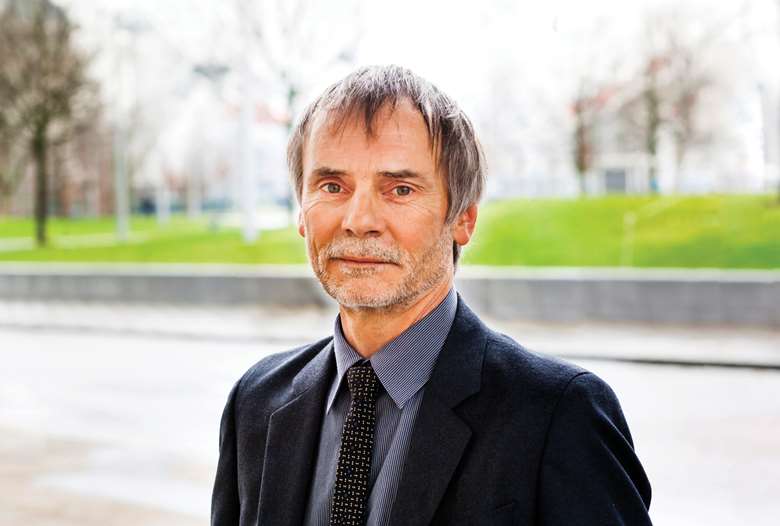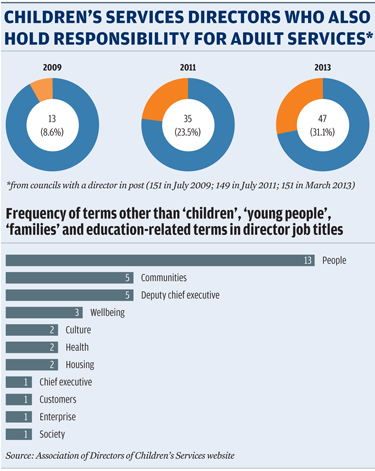Remit of children's chiefs expands as Webb takes on ADCS presidency
Neil Puffett
Tuesday, March 19, 2013
Andrew Webb, the first president of the Association of Directors of Children's Services not to have the word "children" in his title, tells CYP Now his policy priorities for the year ahead and his views on an evolving role

As if they do not have enough already on their plate, directors ?of children’s services are continuing to take on additional responsibilities as councils across England reconfigure their services to cope with shrunken resources.
It is an evolution highlighted by the case of Andrew Webb. Next month, he will become the first president of the Association of Directors of Children’s Services not to have the word “children” in his job title.
Webb holds the title of corporate director of services to people in Stockport. He is one of a growing number of children’s services chiefs with responsibility for adults’ services as well as under-18s.
The number of these so-called “twin hatters”, with oversight of both children and adults, has risen markedly in the past four years, from 13 in 2009 to 47 this year. They now make up nearly one third of all 152 children’s services chiefs, despite the Munro review of child protection’s call to protect the role from departmental mergers.
“I expect the numbers will go up in the future,” Webb predicts. He says the “massive downsizing in local government” has forced councils to re-evaluate their number of director-level positions. “The other question is: can you in fact have a more joined-up approach to services if you combine them in one directorate?”
Webb is adamant that those with dual roles can still deliver for children and families. He says councils must carry out a “test of assurance” if they give additional duties to a children’s services chief. “Every authority needs to look at its own resources,” he says. “Adult care is largely commissioned to external providers, so it is quite a different role to 20 years ago.”
But what will this trend mean for the future identity of the ADCS, established in the wake of the 2004 Children Act, which created the DCS role? Might a merger between ADCS and the Association of Directors of Adult Social Services even be on the cards? “I wouldn’t want to speculate,” says Webb. “At the moment, the roles are distinct and I can see it remaining that way for the foreseeable future.”
Right now, however, as he prepares to take over the ADCS presidency from Debbie Jones, Webb is focused on his policy priorities for the coming year.
THE CARE SYSTEM
Webb has three propositions for improving what he regards as the “least successful” element of the care system, namely “teenagers entering care for the first time”.
His proposals involve rethinking how care for young people is structured; better use of kinship care; and more robust outcomes-based commissioning. “We need to rethink the way we engage with adolescents across the spectrum – youth justice, the care system and wider family support – which are often working against each other,” Webb says.
He supports social pedagogical methods in addressing the needs of young people who move in and out of custody or care, those excluded from school, and those who receive mental health or drug and alcohol services. “I want to look at how we can take a more holistic approach to meeting their needs rather than having six or seven different sites of specialists.” He says pedagogical approaches can be vital in honing in on the needs of individual young people and their families and avoiding a fragmented response: “If you were to do that, there are some economies to be found.”
On kinship care, Webb points to positive results from Spain and parts of the US where it is used extensively. “The evidence we have been looking at suggests that with a different support commitment to kinship placements – whether that be financial or parenting support – more adolescents would stay in communities and wouldn’t end up in the care system,” he says.
The third pillar of his vision for care is commissioning more explicitly for outcomes. “A lot of placements to residential care are less than ideally planned,” he says. “We commission beds rather than outcomes. There are some quality issues and distance-from-home issues. But nobody says, and Ofsted doesn’t say: ‘If you use this placement, how will we know if it’s a success?’ No head teacher would expect Ofsted to walk away without saying: ‘What is the positive difference?’. Yet children’s homes are not being inspected or commissioned for major change, even though this is where most troubled youngsters are.”
SCHOOLS
Despite the growth of academies and free schools, Webb is confident that local authorities can, and will, have significant involvement in both the organisation and the content of children’s education.
“As an association, we have an incredible wealth of expertise in education, teaching and planning, and how to get the best for our children,” he says. “I want us to concentrate on how we ensure improvement concentrates on the breadth of need in the population, and is more outcomes-focused.”
This will involve pursuing more appropriate measures of success than exam results alone and playing a role in the future shape of the school curriculum. “If we are going to have a debate about whether there is a national curriculum and what should be in it, the ADCS should have a strong view,” he says.
“We know how to engage with schools – we need to be clear about the ways we intervene. Whether academies are good or not is the wrong debate. It is about what academies should be teaching, and how they should be teaching it.”
MUNRO REFORMS
Webb believes there is still a long way to go on implementing the child protection reforms set out in the Munro review.
“Change has not been as fast as she or I would have wanted,” he says. “A lot of practice across the country is very good and always has been very good. But the general standard needed to be raised and that won’t happen overnight. One of the things we needed to move away from was an over-proceduralised approach to quality and we haven’t managed to get far enough away from that. To some extent, Ofsted is still inspecting that. It is moving gradually, but it feels like we might have stalled a bit.”
The next big change around the corner in child protection, he says, is the 26-week time limit to complete care cases. “If routine care proceedings are to finish in less than 26 weeks, then the quality of social work before court needs to be of a higher quality in all places,” he says. “Social workers are going to have their decision making and assessment under scrutiny at a much earlier stage, which will probably provide the impetus for the next rise in standards in social work practice.”
YOUTH CUSTODY
The government’s Transforming Youth Custody green paper proposes putting education at the heart of rehabilitating young offenders through “secure colleges”. As in so many areas of practice, it is keen to hand more control to local agencies.
But Webb says that for local authorities to get involved, the make-up of the youth secure estate would have to become radically different. There would, he says, need to be a large number of small units evenly spread around the country so that children remain near their host authority.
“Unless they break up the current establishments and make much smaller units over a greater geographical area, we are looking at a model where it is hard to link into your local area,” he says. “If there are more standalone facilities, I would say local authorities should be given the statutory duties and powers they have in relation to local schools for those groups as well.”
YOUTH SERVICES
On the challenges and threats facing the country’s youth services, Webb offers a dose of cold hard reality. “The financial situation means that anything that doesn’t have a robust statutory underpinning and robust focus on need is the first area that people are looking to change,” he says.
“We are being forced into a position where we are taking money out of services for young people, particularly universal access services, because they don’t meet those two criteria. It is an abdication from central government to say youth policy is down to local areas. If the consequence of the spending review is that we can’t afford to have a youth policy, then the government should say so.”





